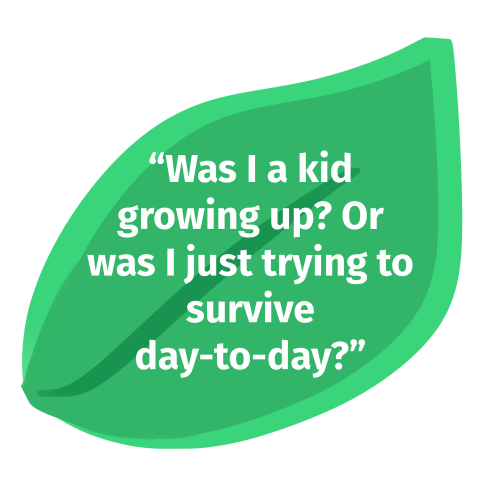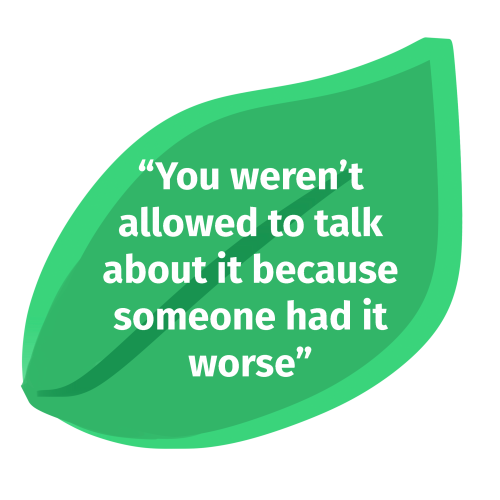BIPOC students say understanding and addressing their mental well-being carries a heavier weight
Words by Madeline Liao
Visuals by Laila Amer
It was a warm summer night as Michael Wamara sat in his pitch black bedroom, scrolling through his phone, looking at symptoms of depression. It was getting hard for him to muster up the energy to wake up every morning, fatigued and unable to attend his online classes as he hit a “breaking point mentally.” Wrapped up in the darkness of his surroundings, he was trying to figure out why exactly he felt so depressed.
It was the midst of a summer of protests in 2020 and the fifth-year performance acting student was engulfed in media depicting Black trauma and anti-Black racism. Scrolling through Instagram, he’d see infographic after infographic detailing vivid descriptions of death and violence, leaving him overwhelmed and triggered. “It’s like a ‘share’ for you, but it’s my entire life for me,” Wamara says. Seeing these posts—coupled with memories of his personal experiences with racism, especially as a child—made it difficult for Wamara to ignore the tight feeling in his chest.
Growing up, conversations around mental health were practically non-existent in his household; it was a hidden secret at home and school, something that was buried under the covers and never spoken about. “Looking back at it now, mental health has been a huge part of my life,” says Wamara. “When you don’t know what it is, it just hurts even more.”
Throughout his life, Wamara lived in and around the Greater Toronto Area. He moved from North York to Scarborough and then to the east-end of Toronto, where he lived until his third year of university. Even though he was then living in a predominantly white area, his friends consisted mostly of non-Black people of colour and very few Black people. This allowed anti-Blackness to seep into his environment, sometimes without his knowledge. On some occasions, Wamara would invite his friends over to his house and be met with hesitation. “I don’t know if my parents like Black people,” his friends would respond. “I don’t know if they’ll let me.”
At a young age, he learned that he would be treated differently because he was Black. When a white student would cry, teachers were sympathetic, but when he did the same, he was ignored. Wamara’s experiences as a Black child resulted in a lot of pressure and unwarranted emotional weight. He felt like he wasn’t allowed to make mistakes because of his race and, in turn, lost a part of his childhood and was conditioned to suppress his concerns and deal with them in unhealthy ways.
It makes Wamara wonder: “Was I a kid growing up? Or was I just trying to survive day-to-day?”
This is a commonality especially for Black men, writes Khan Bouba-Dalambaye for CBC. Societal norms paint masculinity as strong and unemotional, often making it difficult for men to express vulnerability. For Black men, this mindset is paired with systemic racism and microaggressions, creating further hardships with mental health. “Being told that you shouldn’t be able to express yourself, or to show frustration, it just builds up and up,” says Wamara.
Reflecting on his past experiences with racism and continuing to see anti-Blackness in his everyday life and current events feels debilitating for Wamara. “It’s been exhausting, it’s been tiring.”

Mental health has long carried stigma worldwide as people refrain from speaking about it in fear of being judged or misunderstood. For racialized students at Ryerson, navigating their mental health carries a heavier weight, as they have to fight to address their mental well-being in spite of generational trauma, racism and cultural tradition. These students are unable to share their feelings with their families and communities due to stigma, which results in stifled conversations and leads to isolation and little support when seeking help. However, as these students enter university and gain independence, they report feeling more comfortable addressing their struggles with mental health and recognizing past childhood trauma they’ve previously repressed.
According to a 2016 study from the Mental Health Commission of Canada, stigma surrounding mental health persists in racialized communities, as some families believe mental illnesses are shameful due to fear of being viewed differently within their own culture and by society. This can also create added barriers for racialized individuals to get the support they need. “The desire to hide the problem or the need for privacy to avoid the judgment of others in the community may also impede help seeking,” the study states.
Bernard Piprah, a registered clinical counsellor based in Langley, B.C., says navigating mental health is a complex process for many racialized people. The idea of seeking help, in ways such as going to therapy, is historically rooted in white eurocentric beliefs, some of which have not aligned with the beliefs of Black, Indigenous and racialized communities and families. This, in turn, makes the idea of treating mental health a “societal outlier” for them.
“We want to avoid thinking or discussing the fact that we have [mental health] issues,” says Piprah. He mentions that some families may have preconceived notions about mental health that develop from their surroundings, leading to a tradition of stigma.
For students like Wamara, who were unaware of the importance of mental health prior to university, addressing their well-being is a new concept. “Only recently it was something that we could be starting to talk about and look at, especially for Black, Indigenous, people of colour specifically.”

n Grade 10, Assal Toudehfallah lived their life on “autopilot.” They would go to school, come home, take a four-hour nap and then dive headfirst into school work and extracurricular activities. They followed this same routine every day during their fall semester, in hopes of distracting themself from feeling negative emotions that would otherwise take over.
Toudehfallah, now a second-year media production student, immigrated to Canada from Iran at the age of 16 with their family, and with this came feelings of isolation, homesickness and the guilt of escaping a tough political climate while leaving their friends and extended family behind. During this time, Toudehfallah was also struggling to understand their sexuality and gender, which was impeded by their family’s conservative views. Although they knew they were struggling mentally, the idea of being vulnerable was difficult to accept.

At that time, Toudehfallah and their family were stressed from the move and constantly having arguments, all while being stuck in a toxic long-distance relationship with a partner back in Iran. All these stressors made them emotionally sensitive, leading to their first big panic attack in that same year. “I felt pretty exhausted all the time,” Toudehfallah says. It was an isolating experience for them and they were going through it alone, unable to speak about their situation with the people around them due to fear of being judged or invalidated.
The topic of mental illness was considered taboo in Toudehfallah’s community. “You weren’t allowed to talk about it because someone had it worse,” they say. When mental health issues were discussed, it would be through hushed voices gossiping behind people’s backs. This kind of mindset made them feel like they weren’t allowed to express how they felt and had to hide what they were going through from their family.
Reaching out for help is one of the hardest things you can do, says Stephany Blandino, a pre-registered associate counsellor based in Vancouver.
For individuals like Toudehfallah, who was unable to seek help at the time due to their family situation, Blandino says finding other communities outside of therapy to support you can be helpful. She says that social media can be a powerful tool for accessing information about mental health and finding people with shared values and lived experiences. Services such as support chats and crisis lines are also an option. “Folks need support, folks need community,” Blandino says. “So often if we’re dealing with things in isolation, it can result in a lot of hopelessness.”

In 2020, when Toudehfallah finally started university at Ryerson, their friend mentioned that their health insurance plan, covered by the Ryerson Students’ Union (RSU), covers the cost of therapy. They could now access professional treatment without involving their family. The RSU Health and Dental Plan offers coverage on mental health services such as psychologists and social workers, according to the RSU’s website. Students can use up to $1,000 of coverage per academic year that can be billed to select therapists.
Just a few months ago, Toudehfallah was finally diagnosed with bipolar disorder (BP), a mental illness that is “marked by dramatic changes in mood, energy and behaviour,” according to the Mood Disorders Association of Ontario. Starting therapy has helped them understand their emotions and develop healthier coping strategies. “I don’t feel as lonely and I don’t feel as misunderstood,” says Toudehfallah.
They say having more knowledge on their condition helps them identify when they experience hypomanic episodes, which is when there are changes in behaviour or mood for people with mood disorders, according to HealthLinkBC. During these episodes, Toudehfallah says they’ll read 15 books in one week, go on shopping sprees or do other impulsive things, but they now recognize these episodes as the result of their BP.
While their past experiences were gruelling, they say these hardships became a gateway for them to access more information about their mental health. Without those experiences, they say they may have never gotten to this point of self-awareness.
Toudehfallah knows not everyday will be easy; but these days, they feel more in control of their mental health. Instead of avoiding their feelings, they now have moments where they feel comfortable enough to sit with their negative emotions and let them pass. They say being surrounded by acceptance, from both their family and friends, makes conversations about mental health less shameful. Bringing awareness to mental health has helped Toudehfallah grow closer to their family, finally breaking free from the isolation they felt before.
“It’s liberating to know that I’m not broken.”

hen Kamryn Serrano was 17-years-old, she found herself sitting in the passenger’s seat of her family’s black Honda Civic on her way to the hospital, silently crying as her mom yelled beside her from the wheel. “Everyone’s gonna think you’re crazy,” her mom shouted. “What are our relatives going to say about this?”
Serrano had recently confided in her high school chaplain about how she was feeling; she was overwhelmed because of school, felt mistreated at her workplace and was facing pressure from her parents’ expectations of her. Hoping the chaplain could help, she looked to them for support and advice. She was then directed to a crisis worker in the hospital.

Feelings of anxiety and depression had built up for Serrano in and prior to high school, where she built unhealthy friendships, experienced her first heartbreak and was sexually assaulted by a peer. She felt like the weight of the world was on her and often found herself staring at the ceiling in her childhood bedroom instead of getting out of bed.
As the oldest child in a Filipino immigrant family, the first-year public health student grew up having to take on a maternal role for her younger brother. Before the age of seven, she had keys to the house and babysat her brother, even though she could barely take care of herself. As she got older, her parents’ expectations of her multiplied, becoming unreachable.
Serrano was forced to grow up too fast; she remembers missing birthday parties because she had to take her younger brother to a party, or being unable to play with her friends because she had to stay at home to care for him. Up until a few years ago, she was unaware of the mental toll this took on her life.
“I felt like I couldn’t make mistakes,” she says. As much as she wanted to do childish things like playing outside with friends, the fear of her parents’ disappointment overpowered her wishes.
Chang Linda Liu, a registered clinical counsellor based in Vancouver, says high expectations are common in Asian communities and families. A 2019 study from the Journal of Comparative Family Studies found that immigrant children who were surveyed felt pressured by their parents to succeed. Some parents expressed “very low patience with anything that [is] perceived as shortcomings by their standards.”

Liu says traditional Asian parenting styles can be more “task-oriented and function-oriented,” meaning that children only receive praise and affection when they achieve something. “This notion can have ripple effects down the road,” Liu says. “When you grow older, you may feel like ‘I need to be always achieving things in order to feel like I’m worthy of love.’”
Liu says communicating with empathy is the best way to combat this misguided mindset. She says family therapy, in-depth discussions or even just finding ways to bond through common hobbies are effective in bringing together guardians and children.
After her trip to the hospital in Grade 11, Serrano was diagnosed with obsessive compulsive disorder, major depressive disorder and generalized anxiety disorder. Serrano says finding an official diagnosis for her lack of motivation and mental burnout made things click for both herself and her parents.
Making a medical connection to her mental health has also helped her parents better understand its significance and the importance of expressing and encouraging emotion. Her parents have even done more research about her conditions to better support and understand her experiences.
Now, entering her first year of university, Serrano feels like she can look forward to what’s in store for her in the future. Completing assignments and talking to people has become easier now that she understands her mental limits. “Everything starts to feel right again,” she says.

amara has slowly taken steps to put himself and his mental health first. He took the step to seek a therapist with the help of a friend and has been attending online therapy sessions for the past year. He says it’s been a “great way to start” opening up about his mental health struggles and past trauma. He’s also figured out what helps him cope; whether that be talking with his friends or surrounding himself with nature on long walks.
Therapy has helped Wamara become more comfortable sharing his feelings with his family. He tries to be upfront with them about his mental health, acting as an initiator of conversation around the topic. This, he thinks, is a step towards healing an entire community that has long been oppressed by mental health stigma and institutionalized discrimination. “It makes me more optimistic and happy for when I am going to be able to move further from the mental state that I’m in,” says Wamara.
Although he acknowledges that healing is not linear, knowing that he doesn’t have to wake up everyday with heaviness and that his life can be more than past trauma is “hella hella empowering” in his eyes.













Leave a Reply